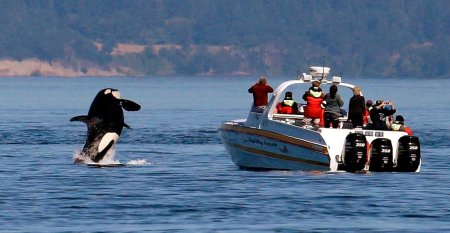A candid close-up with a whale might be a once-in-a-lifetime experience, but conservationists are worried about the impact of videos showing people getting up close and personal with marine mammals — especially when they go viral.

With summer almost here, and prime tourism season with it, a coalition of organizations on Vancouver Island are hoping to help reduce the risk.
“Before you hit the share button or get into a rush to share something, think of the implications of it, the implications on the wildlife themselves and how it might affect the wildlife and their well-being,” said Stephen Gabrysb with the North Island Marine Mammal Stewardship Association.
“If it’s going to be sharing anything that’s going to cause anyone to want to recreate a close encounter or something like that, ultimately that’s not great for the wildlife … just try to hit pause and decide not to share it and don’t chase all those likes.”

The campaign, a partnership between 4VI, the Marine Education and Research Society and the North Island Marine Mammal Stewardship Association, is focused on concerns about copycat behaviour that could be spurred by videos showing surprise close encounters with whales and other marine life.
Those videos, while captivating, may serve to confuse people about Canada’s strict laws around approaching and interacting with marine mammals.
“Marine ecotourism standards in British Columbia are already some of the highest in the world, with operators adhering to strict minimum distance regulations meant to reduce disturbances to wildlife,” explained 4VI vice-president of business impact and engagement Brian Cant.
“However, we still see examples of photos and videos being shared on social media that show close encounters with marine mammals. Our goal is to ensure that visitors are provided with accurate information about safe distances and expectations for guests, without putting wildlife or humans at risk.”
The groups have created a video meant to help illustrate the regulations around marine mammal viewing, and are hoping marine operators will share it on their own social media pages during the high season.

They’re also offering support to tourism operators on the island to develop policies to help reinforce safe, legal marine mammal viewing.
“This collaborative project is about contributing to the culture of best practices for marine ecotourism,” said Jackie Hildering of MERS. “The language and imagery used by operators and the media need to encourage visitors to respect wildlife and the laws we have in place to reduce disturbance.”
Federal regulations require people to keep at least 100 metres away from all whales, dolphins and porpoises, and at least 200 metres away from any that are resting or with a calf.
The regulations are stricter for killer whales, requiring people to keep at least 200 metres away in most areas of B.C., and at least 400 metres away if they’re in southern B.C. coastal waters between Campell River and the area just north of Ucluelet.




Comments